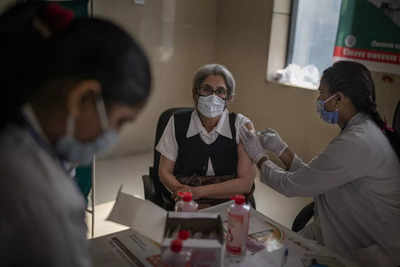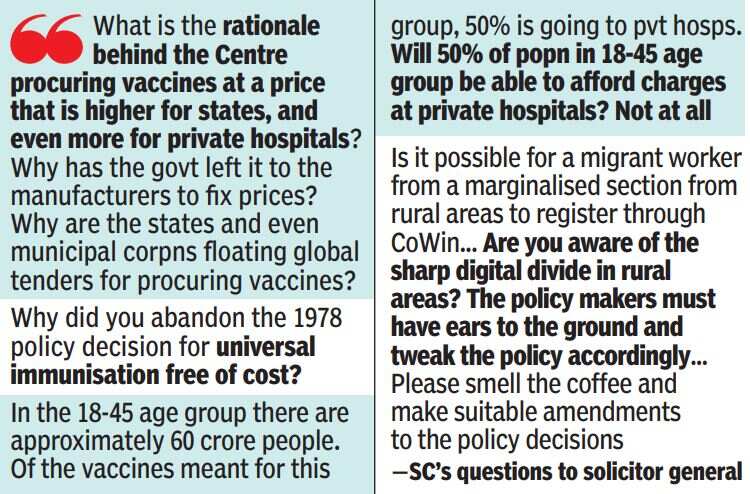Top Searches
- News
- India News
- Jabs for all by December, says govt as Supreme Court quizzes it on vaccine policy
Jabs for all by December, says govt as Supreme Court quizzes it on vaccine policy

The SG said vaccination for all will be free as the states have given a written commitment to this effect to the central government.
NEW DELHI: The Centre on Monday told the Supreme Court that it expects the country's entire population above 18 years to be vaccinated against Covid-19 by the end of the year, but the court remained sceptical of the claim citing impediments in the form of dual pricing and allocation of vaccines at different prices to states and private hospitals.
Solicitor general Tushar Mehta informed a bench of Justices D Y Chandrachud, L N Rao and S R Bhat that taking into account the estimated production by domestic vaccine manufacturers Serum Institute, Bharat Biotech and Dr Reddy's Lab, the government expects "the entire eligible population to be vaccinated by the end of the year".

The bench said, "Till date, we have not seen the vaccination policy document. What led the thinking in the government for dual pricing of vaccines? What is the rationale behind the Centre procuring the vaccines at a price while that for the states is higher, and even more for the private hospitals? Why has the government left it to the manufacturers to fix vaccine prices? Why are the states and even municipal corporations floating global tenders for procuring vaccines? Will it not lead to a skewed supply of vaccines to citizens based on which state they resided in?"
These were among a host of questions that inundated the SG during the two-hour hearing before the bench which asked the Centre to file an affidavit within two weeks. The SG said vaccination for all will be free as the states have given a written commitment to this effect to the central government.
Justice Bhat said, "Whatever be the affidavit, apart from justifying the policy decisions, the Union government must place before the court the policy document and the thinking behind it, including relevant file notings. Why did you abandon the 1978 policy decision for universal immunisation free of cost? The only issue staring at us at this point of time is vaccination."
Justice Chandrachud said Article 1 of the Constitution says India is a Union of States. "When the Constitution so mandates, at a time of national crisis, the government of India should procure the vaccine and distribute them among the states rather than asking the states to fend for themselves. This could leave citizens residing in poor states in the lurch as those states cannot even procure the required quantity of vaccines," he said.
The court appeared unconvinced as to why the 45+ population would get free vaccination through the Centre and why the states have to purchase the vaccines at a higher cost for the population in the 18-45 age group. Justice Chandrachud said, "In the 18-45 age group there are approximately 60 crore people. Of the vaccines meant for this group, 50% is going to private hospitals. Will 50% of the population in the 18-45 age group be able to afford the charges at private hospitals? Not at all. How do we consider marginalised sections, who are not able to fend for themselves, will get vaccinated?"
The bench also raised the issue of difficulties faced by many in registering for a vaccination slot through the CoWin portal. The SG repeatedly said the government is alive to the dynamics of the situation and has tweaked several policy decisions to address difficulties faced by people and has started allowing on-the-spot registration at vaccination centres, besides permitting vaccination drives in housing societies and community centres.
The SG said the mandatory registration is based on the rationale that the person taking the first dose of vaccine should be taking the second dose also and this requires details to be logged. "If the second dose is not taken, even the first dose goes to waste," he said. Justice Rao asked the Centre to give statistical data about urban-rural ratio in vaccinations carried out so far while wondering whether the present vaccination drive was more urban-centric.
Justice Rao said, "Vaccination is not going to rural areas. This needs urgent attention from the governments. The 25% of vaccines allotted to private hospitals would mostly cater to urban populations as private hospitals do not operate in rural areas. This gives an impression that the vaccination policy is excluding rural areas." The SG said the government is alive to the situation and "not oblivious to the ground situation".
Justice Chandrachud said, "Is it possible for a migrant worker from a marginalised section from rural areas to register through CoWin? You shout a lot about digital India. But are you aware of the sharp digital divide in the rural areas? The policymakers must have ears to the ground and tweak the policy accordingly to try address problems faced by all citizens... Please smell the coffee and make suitable amendments to the policy decisions. It cannot be day-to-day ad hoc decisions by the authorities. There has to be a comprehensive policy framework which perhaps is lacking today."
Exasperated by the rapid fire questioning and faulting of policy decisions, Mehta philosophically mused: "Whatever decisions taken by the executive could be replaced by the Supreme Court's wisdom." However, he assured the court that the necessary changes would be carried out in the policy and that the government would answer all queries to the satisfaction of the SC.
Amicus curiae Jaideep Gupta and Meenakshi Arora too suggested universal free vaccination and pleaded with the court for a direction to the governments to keep all crematoria and burial ground facilities functional for a dignified farewell to all those who succumb to Covid.
FacebookTwitterLinkedinEMail
Start a Conversation
end of article
Quick Links
Coronavirus in MumbaiFarm bill 2020Farmers protestCoronavirus in DelhiCoronavirus in BangaloreCoronavirus symptomsCoronavirus in IndiaWest Bengal elections 2021Coronavirus NewsSolar EclipseNPRWhat is NRCCAB BillCAB and NRCAssam election 2021Podcast newsLok SabhaTamil Nadu Election 2021CongressBJP newsKerala Elections 2021Indian ArmyISRO newsSupreme Court
